MI5 Warns Of Possible New Security Threats From Iran

MI5, the UK’s security service, has stated that amid the war between Iran-backed Hamas and Israel, Iran may be exploring new ways to threaten the security of Britain.

MI5, the UK’s security service, has stated that amid the war between Iran-backed Hamas and Israel, Iran may be exploring new ways to threaten the security of Britain.
Speaking at a security summit in the US, Ken McCallum, the Director-General of MI5, referred to "hostile activity by the Islamic Republic in the UK," emphasizing that countering threats from Tehran remains a top priority.
"Iran has been a rising source of concern and a rising source of task for MI5 over the last 18 months or so in particular," he said.
McCallum's comments come in the context of heightened security concerns related to Iran. Last year, Iran International temporarily relocated its television broadcast from London to Washington, DC, due to terrorist threats. The decision to cease Iran International's activities in the British capital was made after the arrest of an Austrian national named Mohammad-Hussein Dovtaev on February 13. He was detained while filming outside the network's premises.
Security agencies, especially after the outbreak of the uprising against the Islamic Republic in September 2022, have increased concerns about threats against Iran International due to its coverage of popular protests.
Iran International resumed broadcasting from its new London studio on September 25.
The Director-General of MI5 refrained from responding to questions about Iran's role in Hamas attacks on Israel.
Senior officials in Western countries have criticized the continuous support of the Islamic Republic for Hamas, but they have stated that they have not found direct evidence of Tehran's involvement in Hamas's invasion of Israel on October 7.
Iranian authorities have repeatedly denied their involvement in Hamas' attacks on Israel.
So far, thousands of people have been killed, wounded, and displaced in the ongoing conflict between Israel and Hamas.
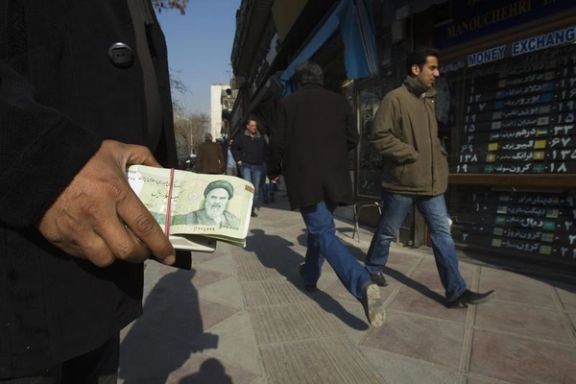
Amid Iran’s claim of stronger economic resilience thanks to higher foreign currency reserves, there are increasing calls for more effective enforcement of US sanctions.
The deputy chief of the Central Bank of Iran, Mohamamd Shirijian, said Tuesday that Iran's foreign reserves are increasing due to the growth of oil and non-oil exports.
He claimed that despite global economic shocks, Iran's GDP grew by 4% in 2022, and the growth rate in Q1 and Q2 of 2023 increased 5.3 and 6.2 percent, respectively.
The claims seem in contradiction to a report by reformist daily Ham-Mihan earlier in the day that forecasted a budget deficit twice as big as the figure in the previous year. The paper said if the country’s revenues in the second half of Iranian year (which ends in March 2024) mirror the trend in the first six months, the budget deficit would significantly worsen in comparison with last year.
It is very difficult to judge the veracity of the Central Bank's optimistic claim, given the lack of any positive movement in Iran's currency markets or the nearly 50-percent annual inflation rate. The current government dominated by hardliners is notorious with making outlandish claims of economic success.
One fact is clear; Iran is exporting much more oil than at any time since early 2018, before the United States withdrew from the JCPOA nuclear deal and imposed tough sanctions on Tehran's oil exports and international banking operations.
Under Trump’s maximum pressure, Iran’s oil exports were down to less than 500,000 barrels per day. Now the figure is reportedly nearly two million barrels. Iran regularly boasts about the rise in its oil exports, but the rise has not translated into tangible changes in the country’s economy.
The national currency rial has lost its value 12-fold since early 2018, when the United States withdrew from the JCPOA and imposed 'maximum pressure' sanctions. This has made imports much more expensive and has led to very high inflation at around 50 percent for the past three years. In recent weeks, the rial lost its value even further to stand at about 520,000 against the dollar over the crisis in Israel and talks of refreezing $6 billion recently released from South Korea under a prisoner swap deal with the US.
In a letter published Monday night, 63 Democrat and 50 Republican US lawmakers called on President Joe Biden to ensure maximum enforcement of all US sanctions and taking any and all steps to end Iran’s oil trade with China, which currently brings in well over $100 million per day in revenue.
In a separate initiative Tuesday, a group of Senate Republicans demanded once more that the administration refreeze the $6 billion parked at Qatari banks as part of a deal to free five hostages from Tehran.
“We know that Iran bankrolls Hamas,” said Senator Balckburn, leading the group. “It is perplexing why this administration refuses to issue a formal decision to freeze the $6 billion. We need to ensure that not another dollar goes to Iran.”
Senator George Marshall, one of the more vocal members of the Senatorial group who demanded the ‘refreeze’ on Tuesday, claimed that under Biden, Iran's currency reserves have gone “from $6 billion to $60 billion” because the regime has been allowed to sell “a billion dollars’ worth of oil every week to China.”
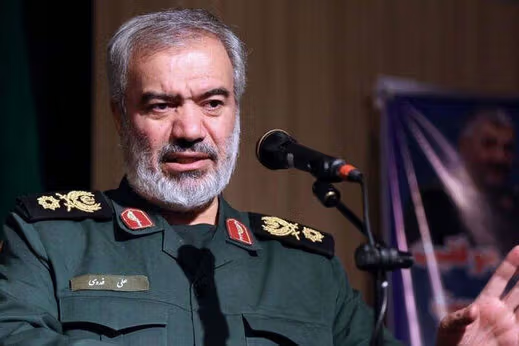
The deputy commander of Iran’s Revolutionary Guard stated on Wednesday that Hamas successfully disrupted efforts to normalize relations between Saudi Arabia and Israel with its attack.
Fars news website affiliated with the IRGC quoted Gen. Ali Fadavi as saying that “Normalization of relations by Saudi Arabia and some Arab countries with the regime occupying Quds was a malicious conspiracy that Americans pursued. They had prepared this conspiracy and were trying to implement it. They had worked on this for years and had reached a particular point.”
Many observers and analysts have commented that the brutal attack by Hamas on October 7 was aimed at derailing talks between the Israel, Saudi Arabia and the United States to reach a normalization deal.
Fadavi stated that with the Hamas attack the normalization efforts totally failed and “those who intended to pursue the effort have now adopted positions against the Zionist regime.”
Top Iranian officials and government media celebrated the Hamas attack as it was unfolding on October 7 and immediately organized street celebrations by regime supporters in Tehran.
Supreme Leader Ali Khamenei dismissed the killing of more than 1,200 Israeli civilians in a speech on Tuesday, saying they were armed and not considered civilians. He also said that many more Palestinians have been killed in Israeli attacks on the Gaza Strip.
The Islamic Republic had never before so openly demonstrated its ties with, and support for militant Arab organizations as it has done since the Hamas attack. Some of these groups in Iraq and Yemen have even threatened the United States if it continues it support for Israel.
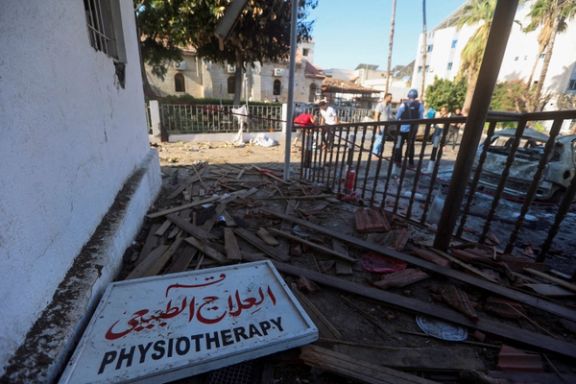
In spite of evidence pointing to the blast coming from a misfired rocket from Islamic Jihad in Gaza, the Iranian regime has called Israel responsible for an attack on the Gaza Baptist hospital on Tuesday night.
The Israel Defence Forces have shared a barrage of intelligence to deny culpability but the regime vowed the incident "will definitely not go unanswered" in another opportunity to fuel the flames of unrest.
A statement on the state news agency said, "Islamic countries and freedom-seeking governments, in addition to severing ties with Israel, should expel its ambassadors and representatives from their countries and international organizations".
Iran also declared that it is necessary for all Muslim nations and Islamic governments to stand against “the illegitimate regime of Israel” and, using all necessary means, put an end to “the endless injustice and the massacre of innocent Muslims.”
An explosion occurred at the al-Ahli Baptist Hospital, a Christian-run medical facility in central Gaza City on Tuesday night, resulting in the deaths of at least 200 to 300 people, as reported by the Palestinian Health Ministry. However, other Palestinian sources cite numbers as high as 1,000.
The ministry's spokesperson, Ashraf Al Qudra, estimated that around 200 others were injured. There have been conflicting claims about responsibility, with officials in Gaza and Israel blaming each other for the tragedy.
Al Qudra alleged that the Israel Defense Forces had targeted the hospital for bombing, and Hamas also blamed Israel, while no evidence of a damaged hospital and hundreds of dead or injured has yet been seen. The damage largely remains contained to a car park and shattered windows.
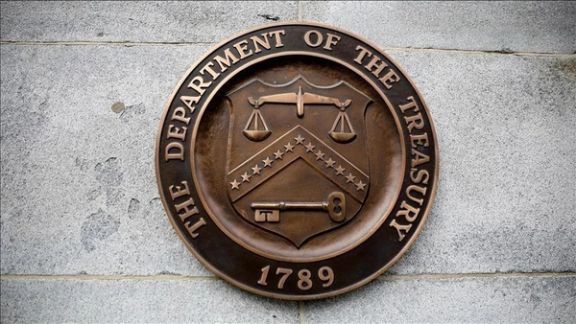
The Biden administration issued sanctions on Wednesday aimed at disrupting Hamas' funding, targeting "a secret Hamas investment portfolio," a financial facilitator tied to Iran.
The sanctions, imposed under a terrorism-related executive order, targeted nine individuals and one entity based in Gaza and elsewhere including Sudan, Turkey, Algeria, and Qatar, the US Department of Treasury said in a statement.
"The United States is taking swift and decisive action to target Hamas’s financiers and facilitators following its brutal and unconscionable massacre of Israeli civilians, including children," said Treasury Secretary Janet Yellen said.
"We will continue to take all steps necessary to deny Hamas terrorists the ability to raise and use funds to carry out atrocities and terrorize the people of Israel," Yellen added.
Treasury's actions come as US President Joe Biden visited Israel and met with Israeli Prime Minister Benjamin Netanyahu following Hamas' October 7 attack.
Iran is believed to have been providing at least $100 million annually to Hamas and a few hundred millions to Hezbollah in Lebanon.
After the Hamas attack on Israel, top Iranian officials and government media celebrated the event and organized street celebrations, voicing their commitment to continue full support to "resistance front", which is a term referring to militant organization Tehran supports in the region.
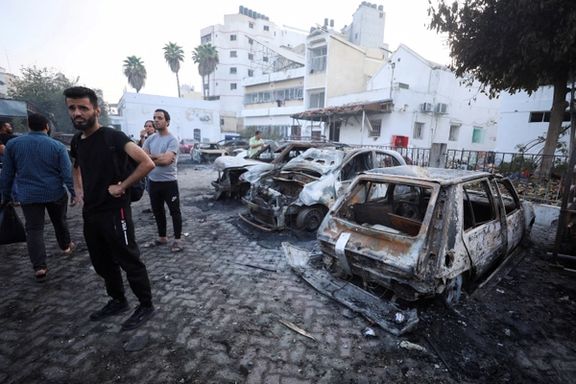
As the hours go by after a hospital was struck in Gaza, questions are being raised as to both the severity of the attack and the number of casualties amid grave concern over the incident.
Within hours of the blast, Palestinian sources were citing hundreds of deaths, numbers as high as 1,000 even being thrown around, for a small 19th century hospital which had a capacity of just 80 beds, according to its website.
Palestinian officials quickly blamed an Israeli air strike for the blast, which it said had killed as many as 500 people. Israel said the blast was caused by a failed rocket launch by the Palestinian Islamic Jihad militant group, which denied blame.
While visiting the region in a bid to quell tensions, US President Joe Biden also spoke quickly to defend Israel, which has been sharing a barrage of intelligence to prove it was not culpable. One such piece of evidence was the intercepted recording of two Hamas operatives on the issue of Islamic Jihad’s failed launch.
Speaking alongside Israeli Prime Minister Benjamin Netanyahu, Biden said: "I was deeply saddened and outraged by the explosion of the hospital in Gaza yesterday, and based on what I've seen, it appears as though it was done by the other team, not you."
But the suggestion that somehow a large hospital building was so severely damaged by a large bomb that caused hundreds of casualties does not correspond to available evidence.
While there are Gazans taking refuge in the likes of the hospital, the parading of dead bodies and casualties has been unusually reserved from the side of Hamas which is usually ready with the body bags and displays of dead bodies. Most images show a crater beside the hospital. Other casualty images have not been confirmed to have come from the hospital.
Footage and images obtained by Reuters from the parking outside the hospital building showed about two dozen destroyed vehicles in its grounds.
Dr Fadel Naim, head of orthopedic surgery, said about 1,000 people were in Al Ahli Arab Hospital on Tuesday morning and more rushed there later in the day after he said the Israeli army had warned residents in the Zeitoun neighbourhood to evacuate their homes.
Dr Ibrahim Al-Naqa claimed more than 3,000 people had sought refuge at the hospital at the time of the strike.
Not even Al Jazeera, the Qatar-funded propaganda machine has been able to show more detailed insight into the alleged atrocity.
If the level of devastation was as serious as has been reported, finding 1,000 bodies underneath rubble would take a great deal of time, not least in Gaza where rescue operations are already underway elsewhere. The rapid flow of numbers again seems worthy of answers, in addition to the true extent of the destruction.
Analysts have been noting the lack of damage to the hospital and its complex, including the chapel and hospital structure which is largely “intact” other than some window damage.
“Update on the chapel at the Ahli Hospital in Gaza, the building lost several of its stained glass windows in the explosion, but otherwise appears to be intact,” wrote @Osinttechnical.
“Full footage from TASS [Russian news agency], no impact craters, interior spaces appear to be intact. Injuries from flying glass appear to have occurred,” he wrote.
Independent intelligence analyst Ronen Solomon from Intellitimes, confirmed that the damage caused by the incident was not consistent with an air strike.
“This picture leaves no doubt, it is a rocket hit and not a bomb. The damage is environmental damage and it does not match the number of deaths reported in Gaza,” he said on X, referring to a Reuters image.
Analyst Oliver Alexander also shared similar insights, referring to the small crater as inconsistent with an airstrike.
“This image [of] what looks to be the only crater that has been visible in any of the currently released footage of the hospital blast,” he wrote on X, suggesting the hospital itself had not been hit directly.
“The failed rocket launch is looking more and more like the culprit in the attack on the hospital,” he wrote.